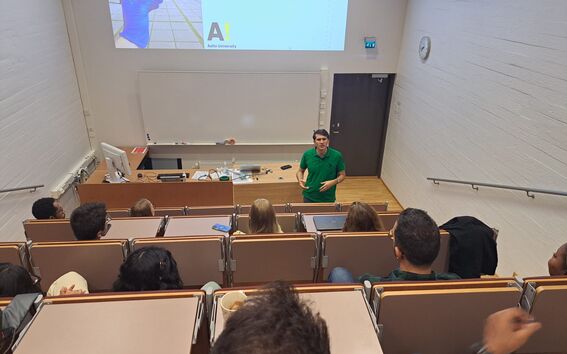Annual meeting of textile chemistry group held
August 8, 2025 – The Textile Chemistry Group convened its Annual Meeting on Friday, August 8, bringing together researchers, doctoral candidates, master’s students, and interns to share their latest work in advancing sustainable textile technologies. The meeting was inaugurated and chaired by Professor Ali Tehrani, Head of the Textile Chemistry Group, who welcomed all members and emphasized the importance of collaborative research in shaping the future of the textile industry.
The day featured a series of presentations spanning diverse aspects of textile sustainability, from recycling and color removal processes to bio-based materials and functional coatings.
The day featured a series of presentations spanning diverse aspects of textile sustainability, from recycling and color removal processes to bio-based materials and functional coatings.

Research highlights:
- Sustainability of nonwovens: PhD scholar Virpi Rämö discussed strategies for facilitating a sustainability transition in nonwoven textiles.
- Bio-Based functional materials: PhD scholar Babak Abdi presented his research on formulating bio-based coatings to achieve electrical conductivity in cellulosic fabrics.
- Color stripping processes: PhD scholar Shubhajit Dutta showcased his work under the TexirC Project, developing methods to remove reactive dyes from textile waste.
- Master’s thesis worker Elsa Vuorenmaa focused on color stripping of reactive-dyed cotton, while summer intern María Fernanda Rivera Ledesmaexplored stripping processes for vat-dyed fabrics. Intern Isla Lizett Rodríguez Bandacomplemented this by presenting treatment strategies for disperse dye removal from polyester waste.
- Biobased surface treatments: PhD scholar Esubalew Kasaw shared his findings on hydrophobization using biobased techniques.
- Innovative coloration methods: Master’s thesis worker Lotta Loikkanen presented her work on textile coloration using bio-based dyes.
- Recycling and circularity: Postdoctoral researcher Md. Reazuddin Repon highlighted his contribution to the EU-funded BIOSUSTEX Project, developing methods to remove color and elastane from post-consumer cellulose.
- Sustainable fibres and recycling: PhD scholar Olamide Badara discussed the development of nonwovens from sustainable fibers.
- Sustainable recycling: PhD scholar Tonmoy Saha presented chemical processing methods for recycled textile fibers.
- Agro-Waste Utilization: PhD scholar Ritesh Sharma demonstrated approaches for valorizing agricultural waste to functionalize cellulosic textiles.
- Multifunctional Textiles: PhD scholar Vafa Fakhri presented his work on multifunctional bio-based textiles.
At the conclusion of the meeting, Professor Ali Tehrani congratulated all participants on their progress, noting the breadth of innovative approaches aimed at tackling pressing sustainability challenges in the textile sector. He emphasized that the collective research efforts contribute to advancing circularity, reducing environmental impact, and paving the way for bio-based solutions in textiles.
The annual meeting reaffirmed the group’s commitment to developing eco-friendly technologies and highlighted the crucial role of young researchers and collaborators in shaping a sustainable textile future.
Read more news
Eden Telila's master's thesis contributed to Ramboll's geotechnical toolkit
Geoengineering alum Eden Telila helped Ramboll automate manual tasks.
Join a Unite! matchmaking event on forging new consortia for Horizon Europe applications
Calling researchers and industry partners to connect at a virtual matchmaking session designed to spark project collaborations for Horizon Europe funding. Registration deadline, 12 March.
Apply Now: Unite! Visiting Professorships at TU Graz
TU Graz, Austria, invites experienced postdoctoral researchers to apply for two fully funded visiting professorships. The deadline for expressions of interest is 20 February 2026, and the positions will begin on 1 October 2026.






